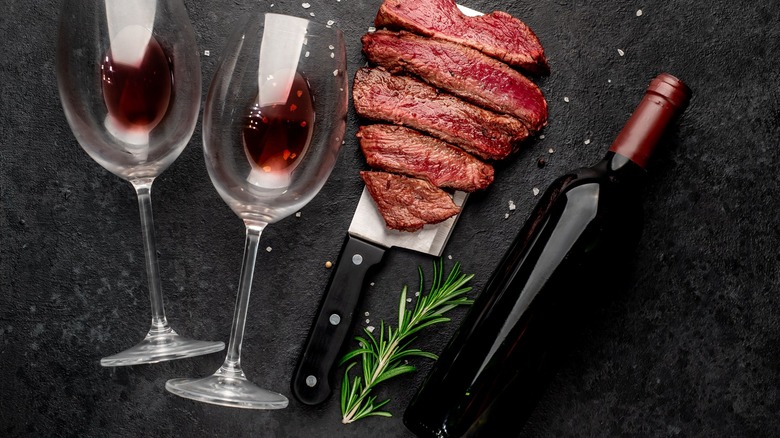Is There Any Truth To Exclusively Cooking With Wine You Would Drink?
Cooking with wine can be notably stressful, particularly if you're unsure what constitutes a good wine for the practice. So, like most people, there's a knee-jerk reaction to turn to the experts on the matter, and they typically all stick to an adage that more or less tells you, "Cook with a wine that you'll drink." Julia Moskin of The New York Times attributes the start of the axiom to Julia Child, who famously once said, "If you do not have a good wine to use, it is far better to omit it, for a poor one can spoil a simple dish and utterly debase a noble one."
Given the person who made the decree, it's hard to argue. Still, the question remains — is it true? Well, the short answer: yes and no. Granted, that may not be a satisfying reply, but it's as close as you can get to an honest response considering all the details involved.
The specifics of cooking with drinkable wine (or not)
First, look at wine's cooking purpose to get to the heart of this frustrating explanation. The liquid is quite versatile and used for many applications, and plenty of chefs are willing to offer tips on cooking with wine to take out the guesswork. Still, its main attraction is to impart unique flavor profiles. This can occur either through its acidic content or sweet taste, depending on whether it's dry or not, which infuses into the other ingredients. Pete Dreyer, a food writer with Great British Chefs, agrees with this and offers the reason to Decanter. "In most sauces, the most important thing is to consider the sweetness and acidity," he said. "As you cook off the alcohol and reduce the wine, both will become more pronounced."
Hence, why an acrid, sour wine will only become more unbearable, and an overly sugary one might as well be jam. However, this also provides a little more clarification on whether an undrinkable wine can be used. For instance, when deciding if a wine is worth a glass or should be thrown away, most people often rely on how it tastes, but that doesn't necessarily mean a bottle isn't drink-worthy — just that it's not your preference. As a result, you should be fine as long the flavors meet your standards, and you're mindful of how they'll meld with the other ingredients in the cooking process (which will enhance the flavors in the wine).
Defining Drinkability
Drinkability is subjective. Yet, there are a few things to watch out for when picking a cooking wine. Most agree that an excessively saccharine white (or red, for that matter) might not be the best option for savory dishes (unless you're looking for a sweeter undertone). At the same time, a red with a heavy tannic profile should be avoided. This is because the tannins in wine, much like sugar and acid, will intensify while cooking.
Moreover, although an opened bottle of wine sitting out on a countertop for a few weeks might be adequate, never cook with spoiled, vinegary wine — especially if it's corked — and you'll be able to tell. Typically, it has a dingy smell, like wet mold. This happens when the wine has come into contact with a chemical compound known as 2,4,6-trichloroanisole (TCA), and "It can transfer into barrels and cellars, so even wines with screw caps or glass closures can have cork taint." as Danielle Kuzinich, the proprietor of the San Francisco Wine Society, told Food and Wine.
Nevertheless, your definition of what constitutes drinkable comes into play here, so if you're undecided about a specific bottle, try reducing the wine before adding it to a dish. This will allow you to test whether it's acceptable and give the maximum flavor if incorporated. Either way, whether it's cheap, old, or something you wouldn't necessarily drink, that doesn't mean you can't cook with it — so, to answer, it is a yes and no.


